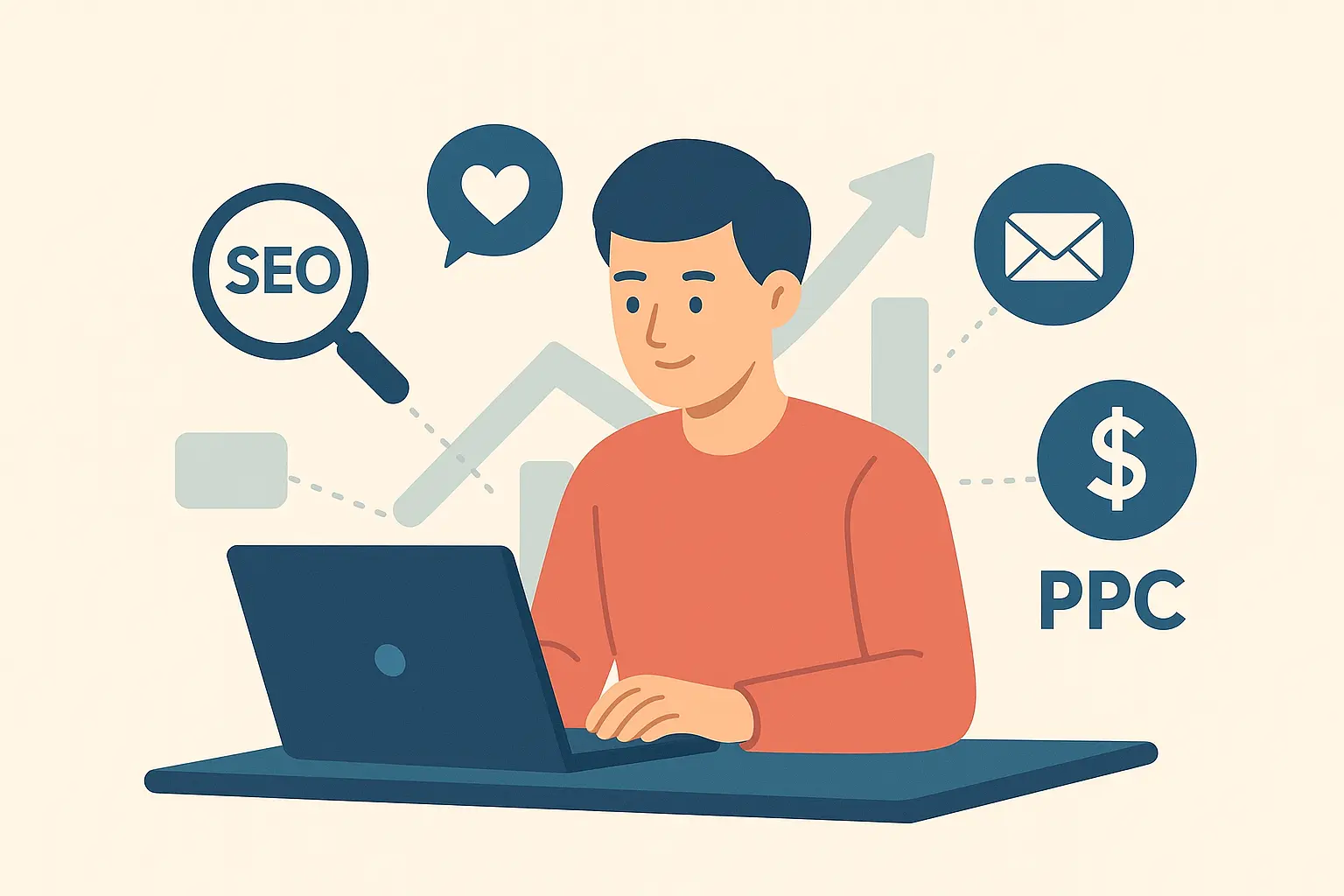Why Starting a Digital Marketing Business is a Smart Choice
If you’ve been thinking about becoming your own boss, starting a digital marketing business is one of the most rewarding opportunities today. Unlike traditional businesses that require large upfront investments, a digital marketing agency can be started with minimal resources but has the potential to scale into a multi-six or even seven-figure company.
Why is this business model so powerful?
- Explosive demand: Businesses of all sizes—from startups to multinational corporations—need digital marketing to survive.
- Low entry barrier: With just a laptop, internet, and skills, you can begin.
- Scalability: You can work solo, then gradually hire freelancers or employees.
- Global reach: Location doesn’t matter—you can serve clients worldwide.
💡 According to a 2025 report by Statista, digital advertising spending will surpass $876 billion by 2026, with SEO, social media marketing, and content marketing leading the growth.
In this guide, we’ll cover everything you need to know about how to start digital marketing business successfully.
Understanding the Digital Marketing Industry
What is Digital Marketing?
Digital marketing involves promoting products or services using digital channels such as search engines, websites, social media, email, and mobile apps. Unlike traditional advertising, it’s measurable, scalable, and highly targeted.
For example, instead of placing a billboard hoping people will notice, digital marketing allows you to run Facebook ads targeting 25-35-year-old professionals living in New York who are interested in fitness.
Current Trends in Digital Marketing
Keeping up with trends is critical for staying competitive. Here are some 2025 trends shaping the industry:
- AI-driven automation: Tools like ChatGPT, Jasper, and HubSpot AI automate campaigns.
- Short-form video dominance: TikTok, Instagram Reels, and YouTube Shorts are leading in engagement.
- Voice search optimization: With Alexa and Siri, more users search by voice.
- Data privacy focus: With stricter data protection laws, ethical marketing is more important.
- Hyper-personalization: Tailored campaigns boost conversions.
Benefits of Running a Digital Marketing Business
- Recurring income: Clients often pay monthly retainers.
- Diverse revenue streams: SEO, paid ads, content creation, consulting.
- Freedom: Work remotely, choose clients, set your hours.
- Impact: You directly help businesses grow and succeed.
Essential Skills You Need Before Starting
Digital marketing is both art and science. You need technical mastery as well as interpersonal skills.
Technical Skills You Should Master
- SEO (Search Engine Optimization): Learn keyword research, on-page SEO, link building, and local SEO.
- PPC (Pay-Per-Click Advertising): Master Google Ads, Facebook Ads, and LinkedIn Ads.
- Content Marketing: Blog writing, copywriting, and storytelling.
- Email Marketing: Tools like Mailchimp, ConvertKit, and ActiveCampaign.
- Social Media Marketing: Managing campaigns across Instagram, TikTok, LinkedIn, and Twitter.
- Analytics: Use Google Analytics, SEMrush, and Hotjar to track performance.
Soft Skills You Can’t Ignore
- Sales and Negotiation: Closing deals with confidence.
- Communication: Simplifying complex marketing terms for clients.
- Problem-Solving: Quickly adjusting strategies when campaigns underperform.
- Time Management: Balancing multiple clients without burnout.
- Client Relationship Building: Long-term contracts depend on trust.
💡 Pro Tip: You don’t need to be an expert in everything. Many successful founders outsource technical tasks while focusing on sales and strategy.
Choosing Your Niche in Digital Marketing
Why Niche Selection is the Secret to Growth
If you try to be a “jack of all trades,” you’ll compete with thousands of agencies. But if you specialize in a niche, you can position yourself as an expert and charge higher fees.
For example, an agency that only helps real estate companies with SEO and Facebook ads will attract real estate clients faster than a generalist agency.
Popular Niches in 2025
- Real estate marketing
- E-commerce & dropshipping stores
- Fitness trainers & gyms
- Health & wellness brands
- Tech startups & SaaS companies
- Local services (lawyers, dentists, restaurants)
How to Identify a Profitable Niche
- Passion + Market Demand: Pick a niche you enjoy but ensure it has enough businesses willing to invest.
- Recurring Revenue Potential: B2B niches often pay more consistently than B2C.
- Competition Check: Too much competition = harder to enter. Too little = weak demand.
Creating a Business Plan for Your Digital Marketing Agency
A solid business plan keeps you focused and helps you secure funding (if needed).
Defining Your Business Model
Options include:
- Full-service agency: Offering SEO, ads, email, content, and social media.
- Specialized agency: Example – only PPC management or only SEO.
- Consulting model: Advising businesses but outsourcing execution.
Setting Goals and Milestones
- Short-term (0–6 months): Build your website, create portfolio, get first 2–3 clients.
- Mid-term (6–12 months): Establish consistent income, create repeatable processes.
- Long-term (1–3 years): Hire a team, scale revenue to six figures.
Budgeting and Financial Planning
Expected expenses:
- Domain + Hosting = $100/year
- Tools & Software = $200–500/month
- Marketing = $200–1000/month
- Legal Setup = $300–800 (depending on region)
Legal & Business Setup Requirements
Registering Your Business
Choose the right legal structure:
- LLC (Limited Liability Company): Protects your personal assets.
- Sole Proprietorship: Easy to set up, but no legal protection.
- Partnership: For multiple founders.
Licenses, Taxes, and Compliance
- Register with local tax authorities.
- Set up a business bank account.
- Consider hiring an accountant to manage finances.
💡 Remember: A well-structured legal setup makes clients trust you more.
Building Your Digital Marketing Brand
Designing a Professional Website
Your website is your digital storefront. Include:
- About us page with your story
- Service pages with pricing & packages
- Case studies or mock campaigns
- Contact form
Creating a Brand Identity
Invest in consistent branding:
- Logo that reflects professionalism
- Colors and fonts that align with your niche
- Tagline that speaks to your audience
Showcasing Your Portfolio
If you don’t have client work yet:
- Do free projects for small businesses.
- Create mock campaigns.
- Publish your own blog posts showing expertise.
Tools & Software You’ll Need to Get Started
Running a successful agency requires smart tools:
SEO Tools
- SEMrush – keyword research & site audits.
- Ahrefs – backlink analysis.
- Google Search Console – free SEO insights.
Social Media Tools
- Buffer or Hootsuite – scheduling posts.
- Canva Pro – designing creatives.
- Later – Instagram planning.
Analytics & Project Management
- Google Analytics – track traffic & conversions.
- Trello / Asana – task management.
- Slack – team communication.
💡 Start lean—don’t overspend on tools until you have steady clients.
Pricing Your Services Strategically
Pricing Models
- Hourly rate: Best for freelancers, $30–$150/hour.
- Project-based: Fixed price for a one-time project (e.g., $1000 for website SEO).
- Retainer model: Monthly recurring packages ($1000–$10,000/month depending on services).
Determining Your Value
- Research competitor rates.
- Factor in your time, expertise, and results.
- Increase prices as your portfolio grows.
How to Get Your First Clients
Networking & Referrals
- Attend local business events.
- Leverage LinkedIn networking.
- Ask friends or past colleagues for referrals.
Freelance Platforms
- Use Upwork, Fiverr, Freelancer, and Toptal to get initial projects.
Cold Outreach & Email Marketing
- Build a prospect list of businesses lacking strong digital presence.
- Send personalized pitches offering value.
💡 Example: “I noticed your restaurant website doesn’t appear in Google’s top 10 results. I specialize in SEO for local businesses and would love to help you gain more foot traffic.”
Effective Marketing Strategies to Grow Your Agency
Content Marketing & Blogging
- Publish blogs targeting “how-to” queries.
- Use SEO keywords to attract organic traffic.
- Share case studies to prove expertise.
Social Media Marketing
- Position yourself as a thought leader on LinkedIn.
- Use Instagram to showcase creative campaigns.
Paid Ads & Lead Generation
- Run Facebook ads targeting small business owners.
- Use LinkedIn ads for B2B clients.
Building a Strong Team (If You Want to Scale)
Hiring Freelancers vs Full-Time Employees
- Start with freelancers to reduce costs.
- Hire full-time employees once revenue is consistent.
Outsourcing Certain Tasks
Delegate repetitive tasks like content writing, graphic design, or keyword research so you can focus on strategy and sales.
Challenges in Starting a Digital Marketing Business
Competition & Market Saturation
Differentiate yourself by niche focus, transparency, and proven results.
Managing Client Expectations
Set realistic goals—avoid promising “#1 rankings overnight.”
Keeping Up with Industry Changes
Subscribe to blogs like Moz, HubSpot, and Search Engine Journal to stay updated.
Case Study: Success Stories of Digital Marketing Entrepreneurs
- Neil Patel Digital – Started with blogging, now a multi-million dollar agency.
- Gary Vaynerchuk’s VaynerMedia – From wine vlogs to a global agency.
- Smaller freelancers who scaled from Fiverr gigs to six-figure agencies.
These stories show that anyone can succeed with consistency and execution.
FAQs About Starting a Digital Marketing Business
Q1. How much does it cost to start a digital marketing business?
Anywhere from $500–$2,000 depending on tools and legal setup.
Q2. Do I need certifications?
Not mandatory, but Google Ads, HubSpot, and Facebook certifications add credibility.
Q3. How soon can I make money?
Some agencies land clients within the first month, while others take 3–6 months.
Q4. Should I specialize or be full-service?
Start with a niche, then expand into full-service once you have resources.
Q5. Can I work remotely?
Yes—most digital marketing agencies are remote-first businesses.
Q6. What’s the average income potential?
Freelancers make $50k–$80k/year. Small agencies can scale to $250k–$1M/year.
Conclusion: Taking the First Step Toward Your Digital Marketing Business
Starting a digital marketing business is not just about money—it’s about freedom, flexibility, and impact. With minimal startup costs, growing demand, and the ability to work globally, this business offers limitless potential.
But remember: success requires patience, skills, and consistency. Begin small, land your first client, deliver outstanding results, and scale gradually.
Your dream of owning a profitable digital marketing business is within reach. Take the first step today—because the sooner you start, the sooner you’ll succeed.
🔗 Recommended Resource: HubSpot Free Digital Marketing Resources
✨ “From SEO to Ads, we handle it all. Start your journey with SouravLabs and watch your business shine online.”


